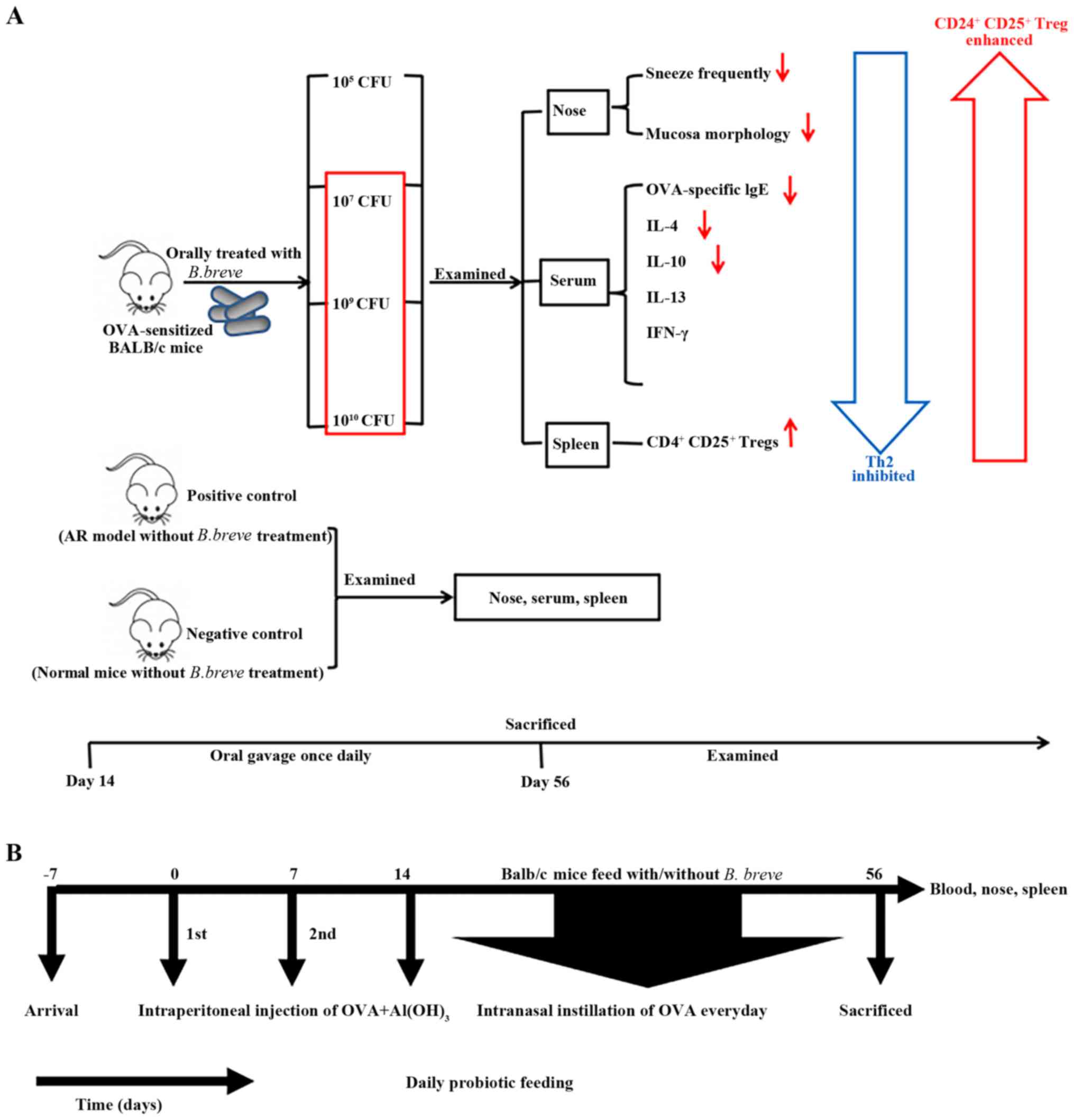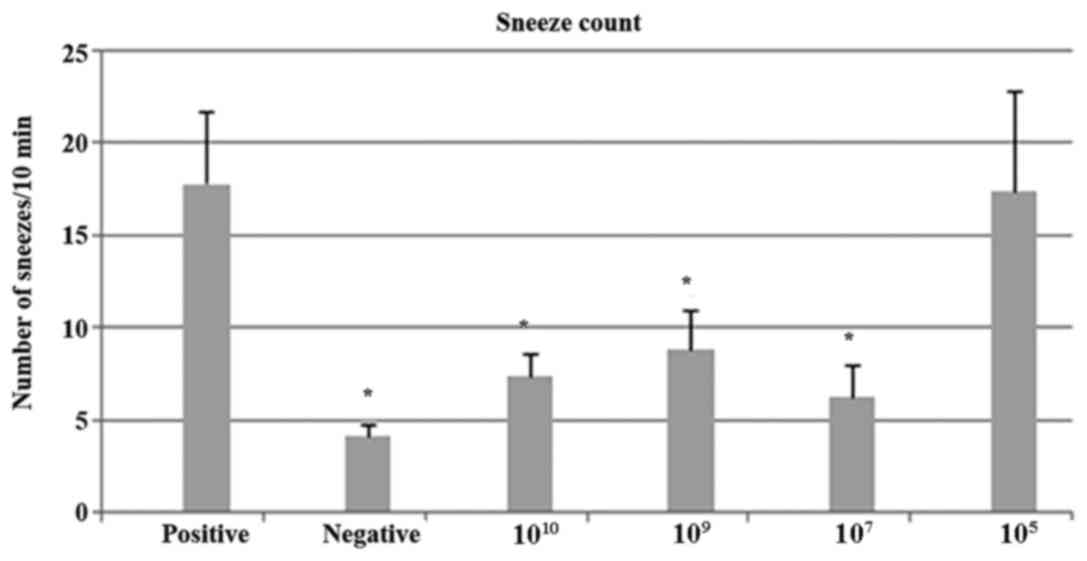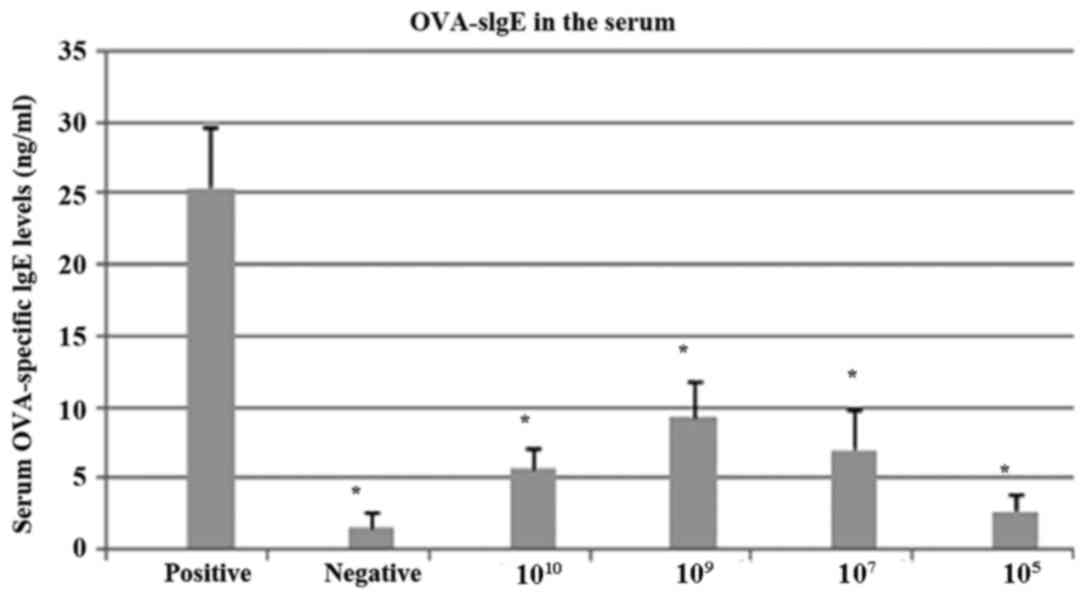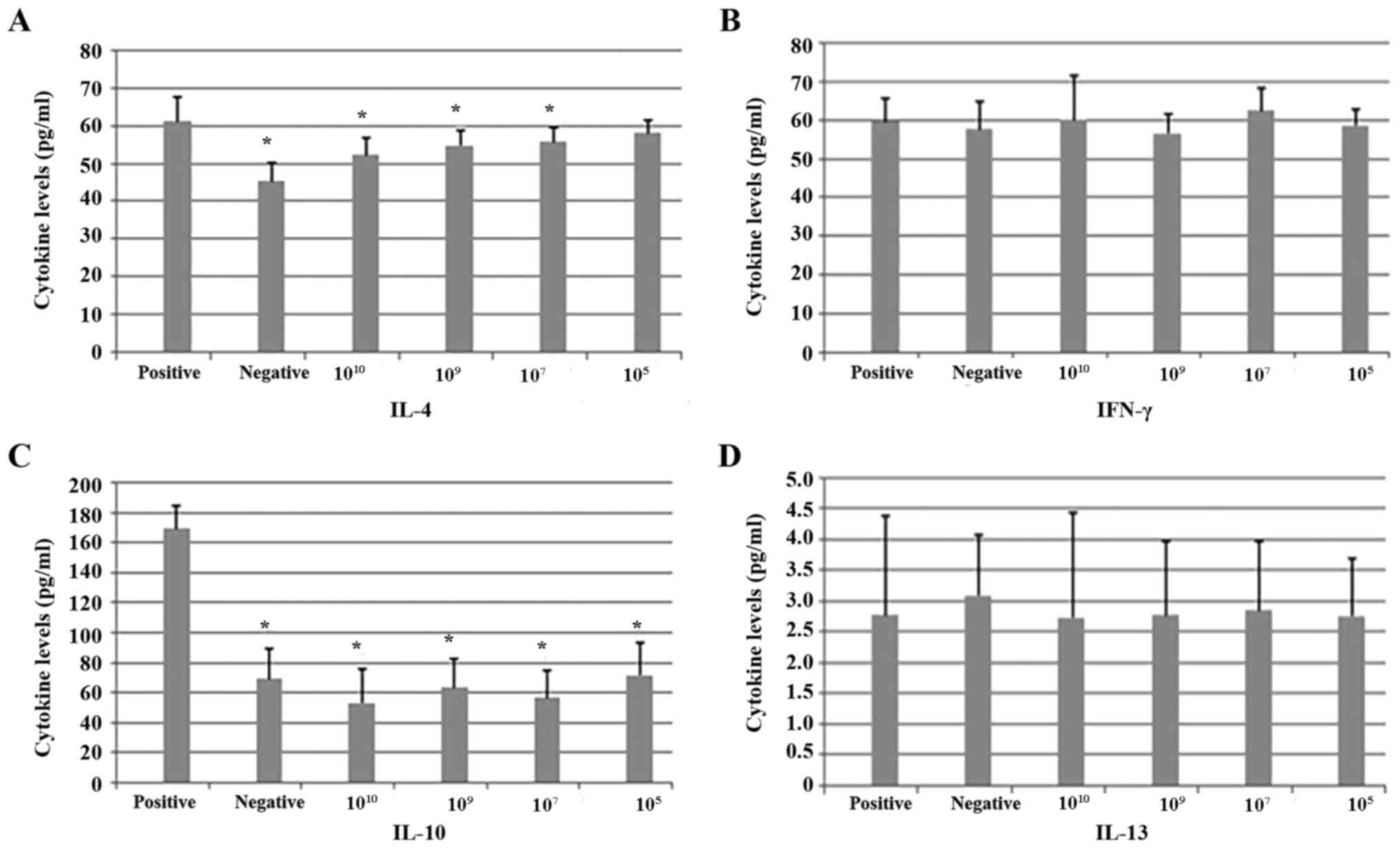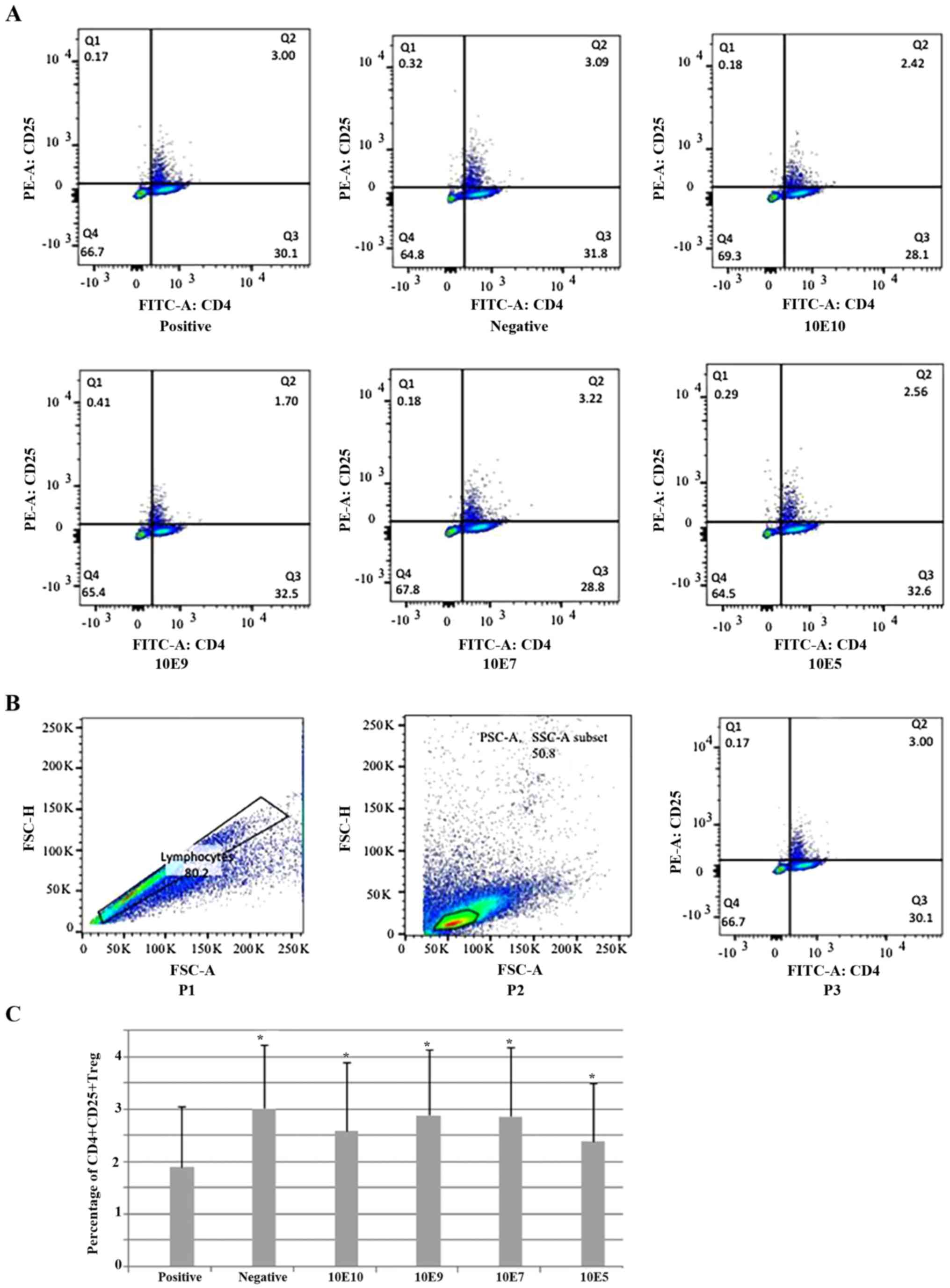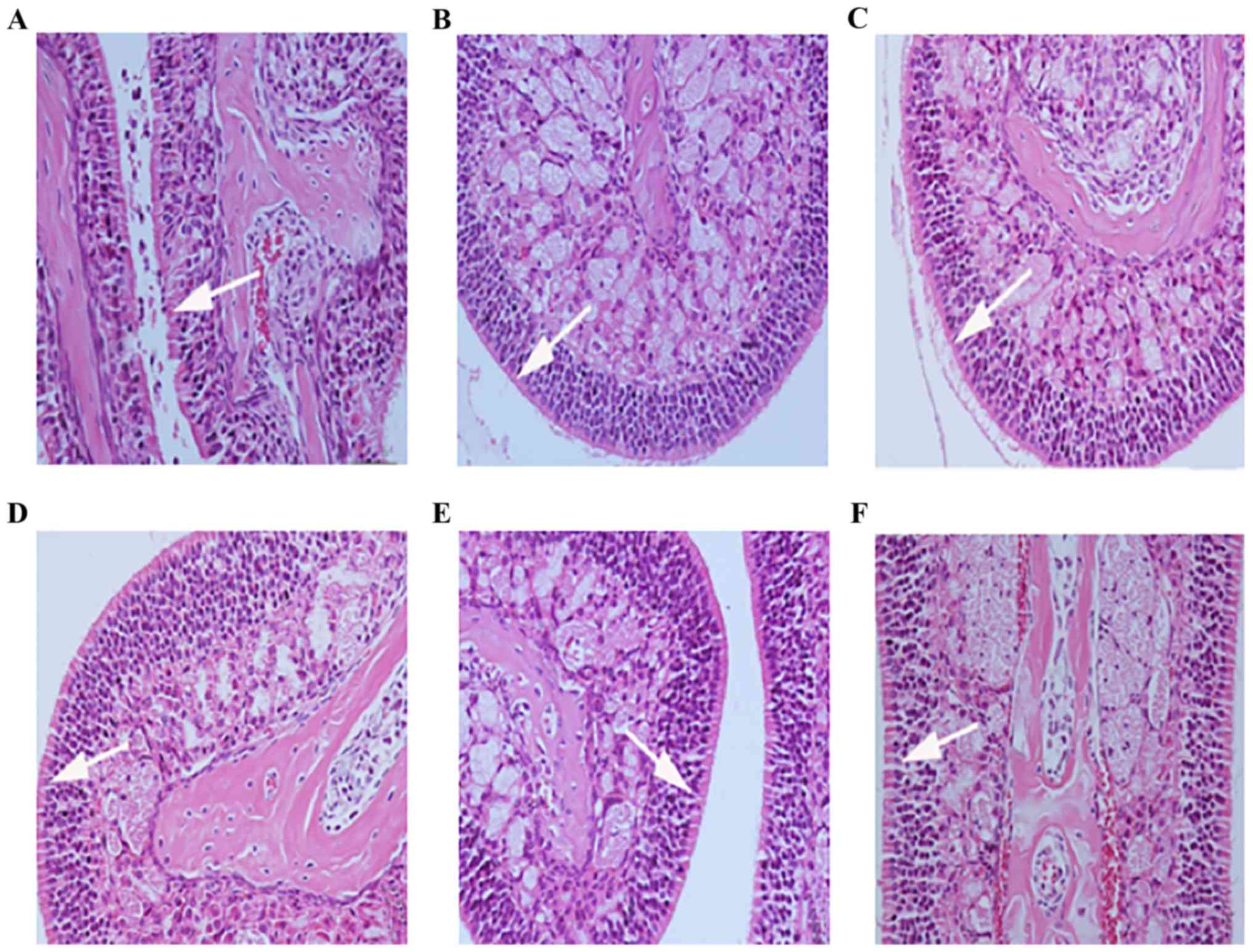|
1
|
Rosenwasser LJ: Mechanisms of IgE
Inflammation. Curr Allergy Asthma Rep. 11:178–183. 2011. View Article : Google Scholar : PubMed/NCBI
|
|
2
|
Pawankar R, Mori S, Ozu C and Kimura S:
Overview on the pathomechanisms of allergic rhinitis. Asia Pac
Allergy. 1:157–167. 2011. View Article : Google Scholar : PubMed/NCBI
|
|
3
|
Takahashi N, Kitazawa H, Iwabuchi N, Xiao
JZ, Miyaji K, Iwatsuki K and Saito T: Immunostimulatory
oligodeoxynucleotide from Bifidobacterium longum suppresses Th2
immune responses in a murine model. Clin Exp Immunol. 145:130–138.
2006. View Article : Google Scholar : PubMed/NCBI
|
|
4
|
Ashour HM and Niederkorn JY: Expansion of
B cells is necessary for the induction of T-cell tolerance elicited
through the anterior chamber of the eye. Int Arch Allergy Immunol.
144:343–346. 2007. View Article : Google Scholar : PubMed/NCBI
|
|
5
|
Ashour HM and Seif TM: The role of B cells
in the induction of peripheral T cell tolerance. J Leukoc Biol.
82:1033–1039. 2007. View Article : Google Scholar : PubMed/NCBI
|
|
6
|
Kwon HK, Lee CG, So JS, Chae CS, Hwang JS,
Sahoo A, Nam JH, Rhee JH, Hwang KC and Im SH: Generation of
regulatory dendritic cells and CD4+ Foxp3+ T cells by probiotics
administration suppresses immune disorders. Proc Natl Acad Sci USA.
107:2159–2164. 2010. View Article : Google Scholar : PubMed/NCBI
|
|
7
|
Jang SO, Kim HJ, Kim YJ, Kang MJ, Kwon JW,
Seo JH, Kim HY, Kim BJ, Yu J and Hong SJ: Asthma prevention by
Lactobacillus rhamnosus in a mouse model is associated with
CD4(+)CD25(+)Foxp3(+) T cells. Allergy Asthma Immunol Res.
4:150–156. 2012. View Article : Google Scholar : PubMed/NCBI
|
|
8
|
Zhang LL, Chen X, Zheng PY, Luo Y, Lu GF,
Liu ZQ, Huang H and Yang PC: Oral Bifidobacterium modulates
intestinal immune inflammation in mice with food allergy. J
Gastroenterol Hepatol. 25:928–934. 2010. View Article : Google Scholar : PubMed/NCBI
|
|
9
|
Jutel M, Akdis M, Budak F,
Aebischer-Casaulta C, Wrzyszcz M, Blaser K and Akdis CA: IL-10 and
TGF-beta cooperate in the regulatory T cell response to mucosal
allergens in normal immunity and specific immunotherapy. Eur J
Immunol. 33:1205–1214. 2003. View Article : Google Scholar : PubMed/NCBI
|
|
10
|
McFarland LV: Evidence-based review of
probiotics for antibiotic-associated diarrhea and Clostridium
difficile infections. Anaerobe. 15:274–280. 2009. View Article : Google Scholar : PubMed/NCBI
|
|
11
|
Caramia G: Gastroenteric pathology and
probiotics: From myth to scientific evidence. Current aspects.
Minerva Gastroenterol Dietol. 55:237–272. 2009.(In English,
Italian). PubMed/NCBI
|
|
12
|
Round JL and Mazmanian SK: The gut
microbiota shapes intestinal immune responses during health and
disease. Nat Rev Immunol. 9:313–323. 2009. View Article : Google Scholar : PubMed/NCBI
|
|
13
|
Kim HJ, Kim YJ, Lee SH, Kang MJ, Yu HS,
Jung YH, Lee E, Seo JH, Kwon JW, Kim BJ, et al: Effects of
Lactobacillus rhamnosus on asthma with an adoptive transfer of
dendritic cells in mice. J Appl Microbiol. 115:872–879. 2013.
View Article : Google Scholar : PubMed/NCBI
|
|
14
|
Castellazzi AM, Valsecchi C, Caimmi S,
Licari A, Marseglia A, Leoni MC, Caimmi D, del Giudice Miraglia M,
Leonardi S, La Rosa M and Marseglia GL: Probiotics and food
allergy. Ital J Pediatr. 39:472013. View Article : Google Scholar : PubMed/NCBI
|
|
15
|
Michail S: The role of probiotics in
allergic diseases. Allergy Asthma Clin Immunol. 5:52009. View Article : Google Scholar : PubMed/NCBI
|
|
16
|
Borchers AT, Selmi C, Meyers FJ, Keen CL
and Gershwin ME: Probiotics and immunity. J Gastroenterol.
44:26–46. 2009. View Article : Google Scholar : PubMed/NCBI
|
|
17
|
Hougee S, Vriesema AJ, Wijering SC,
Knippels LM, Folkerts G, Nijkamp FP, Knol J and Garssen J: Oral
treatment with probiotics reduces allergic symptoms in
ovalbumin-sensitized mice: A bacterial strain comparative study.
Int Arch Allergy Immunol. 151:107–117. 2009. View Article : Google Scholar : PubMed/NCBI
|
|
18
|
Inoue Y, Iwabuchi N, Xiao JZ, Yaeshima T
and Iwatsuki K: Suppressive effects of Bifidobacterium breve strain
M-16V on T-helper type 2 immune responses in a murine model. Biol
Pharm Bull. 32:760–763. 2009. View Article : Google Scholar : PubMed/NCBI
|
|
19
|
Zhang L, Li N, Caicedo R and Neu J: Alive
and dead Lactobacillus rhamnosus GG decrease tumor necrosis
factor-alpha-induced interleukin-8 production in Caco-2 cells. J
Nutr. 135:1752–1756. 2005. View Article : Google Scholar : PubMed/NCBI
|
|
20
|
Gill HS, Rutherfurd KJ, Cross ML and Gopal
PK: Enhancement of immunity in the elderly by dietary
supplementation with the probiotic Bifidobacterium lactis HN019. Am
J Clin Nutr. 74:833–839. 2001. View Article : Google Scholar : PubMed/NCBI
|
|
21
|
Bohr UR, Selgrad M, Ochmann C, Backert S,
König W, Fenske A, Wex T and Malfertheiner P: Prevalence and spread
of enterohepatic Helicobacter species in mice reared in a
specific-pathogen-free animal facility. J Clin Microbiol.
44:738–742. 2006. View Article : Google Scholar : PubMed/NCBI
|
|
22
|
National Research Council: Guide for the
care and use of laboratory animals8th edition. National Academy
Press; Washington, DC: 2011
|
|
23
|
Kawase M, He F, Kubota A, Harata G and
Hiramatsu M: Orally administrated Lactobacillus gasseri TMC0356 and
Lactobacillus GG alleviated nasal blockage of guinea pig with
allergic rhinitis. Microbiol Immunol. 51:1109–1114. 2007.
View Article : Google Scholar : PubMed/NCBI
|
|
24
|
Vliagoftis H, Kouranos VD, Betsi GI and
Falagas ME: Probiotics for the treatment of allergic rhinitis and
asthma: Systematic review of randomized controlled trials. Ann
Allergy Asthma Immunol. 101:570–579. 2008. View Article : Google Scholar : PubMed/NCBI
|
|
25
|
Fallon PG, Jolin HE, Smith P, Emson CL,
Townsend MJ, Fallon R, Smith P and McKenzie AN: IL-4 induces
characteristic Th2 responses even in the combined absence of IL-5,
IL-9, and IL-13. Immunity. 17:7–17. 2002. View Article : Google Scholar : PubMed/NCBI
|
|
26
|
McLeod JJ, Baker B and Ryan JJ: Mast cell
production and response to IL-4 and IL-13. Cytokine. 75:57–61.
2015. View Article : Google Scholar : PubMed/NCBI
|
|
27
|
Toru H, Pawankar R, Ra C, Yata J and
Nakahata T: Human mast cells produce IL-13 by high-affinity IgE
receptor cross-linking: Enhanced IL-13 production by IL-4-primed
human mast cells. J Allergy Clin Immunol. 102:491–502. 1998.
View Article : Google Scholar : PubMed/NCBI
|
|
28
|
Cameron L, Hamid Q, Wright E, Nakamura Y,
Christodoulopoulos P, Muro S, Frenkiel S, Lavigne F, Durham S and
Gould H: Local synthesis of epsilon germline gene transcripts,
IL-4, and IL-13 in allergic nasal mucosa after ex vivo allergen
exposure. J Allergy Clin Immunol. 106:46–52. 2000. View Article : Google Scholar : PubMed/NCBI
|
|
29
|
Chung F: Anti-inflammatory cytokines in
asthma and allergy: Interleukin-10, interleukin-12,
interferon-gamma. Mediators Inflamm. 10:51–59. 2001. View Article : Google Scholar : PubMed/NCBI
|
|
30
|
Tang C, Inman MD, van Rooijen N, Yang P,
Shen H, Matsumoto K and O'Byrne PM: Th type 1-stimulating activity
of lung macrophages inhibits Th2-mediated allergic airway
inflammation by an IFN-gamma-dependent mechanism. J Immunol.
166:1471–1481. 2001. View Article : Google Scholar : PubMed/NCBI
|
|
31
|
Ghadimi D, Fölster-Holst R, de Vrese M,
Winkler P, Heller KJ and Schrezenmeir J: Effects of probiotic
bacteria and their genomic DNA on TH1/TH2-cytokine production by
peripheral blood mononuclear cells (PBMCs) of healthy and allergic
subjects. Immunobiology. 213:677–692. 2008. View Article : Google Scholar : PubMed/NCBI
|
|
32
|
Vuotto C, Longo F and Donelli G:
Probiotics to counteract biofilm-associated infections: Promising
and conflicting data. Int J Oral Sci. 6:189–194. 2014. View Article : Google Scholar : PubMed/NCBI
|
|
33
|
Ozdemir O: Various effects of different
probiotic strains in allergic disorders: An update from laboratory
and clinical data. Clin Exp Immunol. 160:295–304. 2010. View Article : Google Scholar : PubMed/NCBI
|
|
34
|
Sakaguchi S, Yamaguchi T, Nomura T and Ono
M: Regulatory T cells and immune tolerance. Cell. 133:775–787.
2008. View Article : Google Scholar : PubMed/NCBI
|
|
35
|
Nouri-Aria KT and Durham SR: Regulatory T
cells and allergic disease. Inflamm Allergy Drug Targets.
7:237–252. 2008. View Article : Google Scholar : PubMed/NCBI
|
|
36
|
Madsen K, Cornish A, Soper P, McKaigney C,
Jijon H, Yachimec C, Doyle J, Jewell L and De Simone C: Probiotic
bacteria enhance murine and human intestinal epithelial barrier
function. Gastroenterology. 121:580–591. 2001. View Article : Google Scholar : PubMed/NCBI
|
|
37
|
Winkler B, Bolwig C, Seppälä U, Spangfort
MD, Ebner C and Wiedermann U: Allergen-specific immunosuppression
by mucosal treatment with recombinant Ves v 5, a major allergen of
Vespula vulgaris venom, in a murine model of wasp venom allergy.
Immunology. 110:376–385. 2003. View Article : Google Scholar : PubMed/NCBI
|
|
38
|
Schabussova I, Hufnagl K, Wild C, Nutten
S, Zuercher AW, Mercenier A and Wiedermann U: Distinctive
anti-allergy properties of two probiotic bacterial strains in a
mouse model of allergic poly-sensitization. Vaccine. 29:1981–1990.
2011. View Article : Google Scholar : PubMed/NCBI
|
|
39
|
Smits HH, Engering A, van der Kleij D, de
Jong EC, Schipper K, van Capel TM, Zaat BA, Yazdanbakhsh M,
Wierenga EA, van Kooyk Y and Kapsenberg ML: Selective probiotic
bacteria induce IL-10-producing regulatory T cells in vitro by
modulating dendritic cell function through dendritic cell-specific
intercellular adhesion molecule 3-grabbing nonintegrin. J Allergy
Clin Immunol. 115:1260–1267. 2005. View Article : Google Scholar : PubMed/NCBI
|
|
40
|
Ren JJ, Yu Z, Yang FL, Lv D, Hung S, Zhang
J, Lin P, Liu SX, Zhang N and Bachert C: Effects of bifidobacterium
breve feeding strategy and delivery modes on experimental allergic
rhinitis mice. PLoS One. 10:e01400182015. View Article : Google Scholar : PubMed/NCBI
|
|
41
|
Singh A, Hacini-Rachinel F, Gosoniu ML,
Bourdeau T, Holvoet S, Doucet-Ladeveze R, Beaumont M, Mercenier A
and Nutten S: Immune-modulatory effect of probiotic Bifidobacterium
lactis NCC2818 in individuals suffering from seasonal allergic
rhinitis to grass pollen: An exploratory, randomized,
placebo-controlled clinical trial. Eur J Clin Nutr. 67:161–167.
2013. View Article : Google Scholar : PubMed/NCBI
|
|
42
|
Dennis-Wall JC, Culpepper T, Nieves C Jr,
Rowe CC, Burns AM, Rusch CT, Federico A, Ukhanova M, Waugh S, Mai
V, et al: Probiotics ((Lactobacillus gasseri KS-13, Bifidobacterium
bifidum G9-1, and Bifidobacterium longum MM-2) improve
rhinoconjunctivitis-specific quality of life in individuals with
seasonal allergies: A double-blind, placebo-controlled, randomized
trial. Am J Clin Nutr. 105:758–767. 2017. View Article : Google Scholar : PubMed/NCBI
|
|
43
|
Del Giudice Miraglia M, Indolfi C, Capasso
M, Maiello N, Decimo F and Ciprandi G: Bifidobacterium mixture (B
longum BB536, B infantis M-63, B breve M-16V) treatment in children
with seasonal allergic rhinitis and intermittent asthma. Ital J
Pediatr. 43:252017. View Article : Google Scholar : PubMed/NCBI
|















